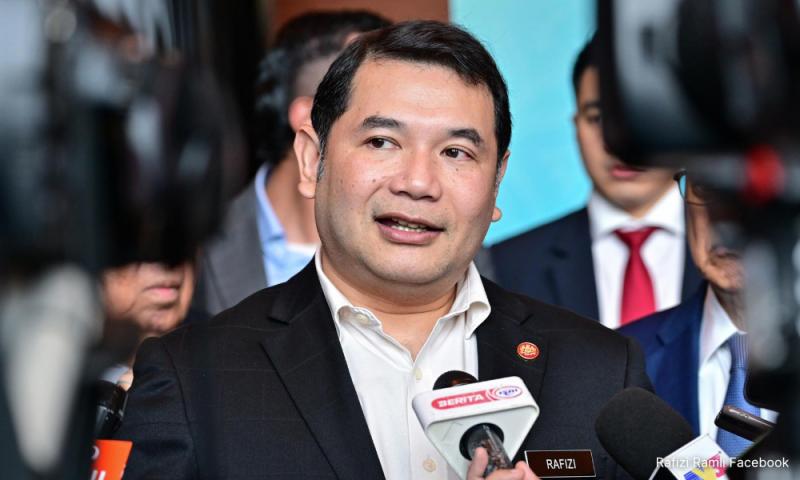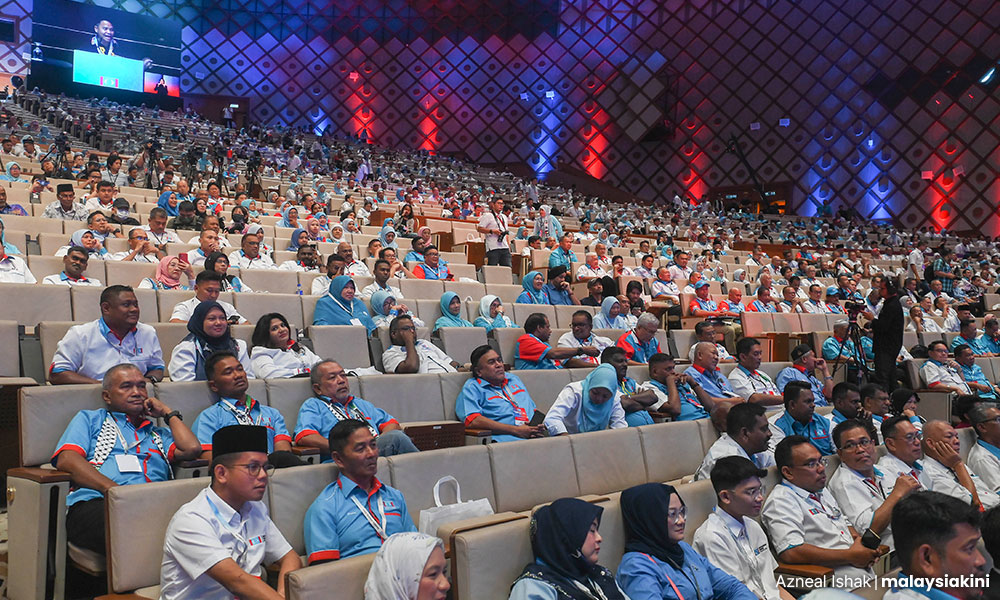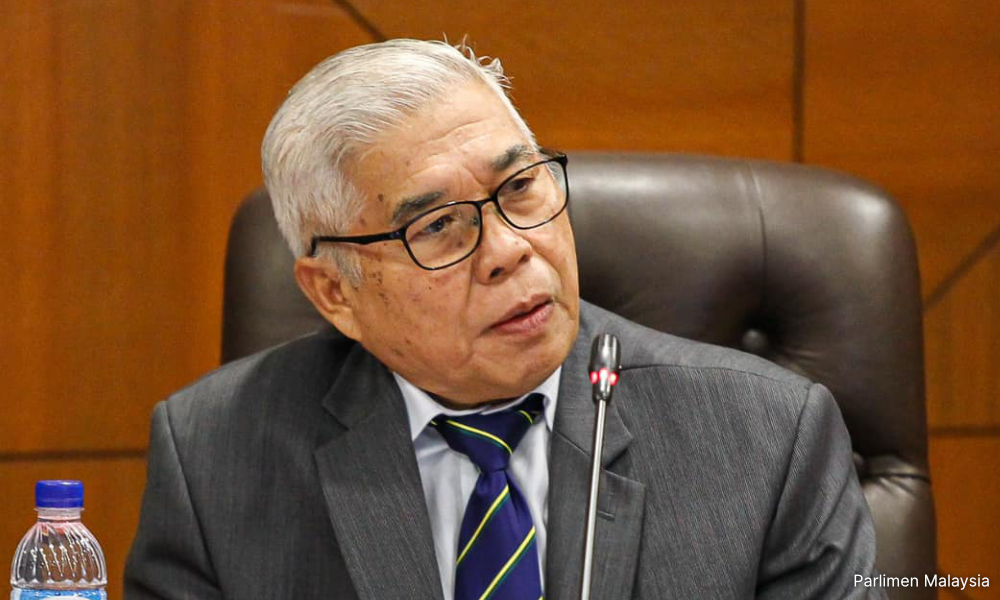

PKR election: How division results threaten Rafizi's grip
Lee Way Loon & Alyaa Alhadjri
Published: Apr 23, 2025 10:15 AM
Updated: 2:04 PM
Summary
- Recent PKR divisional election results have been unfavourable for Economy Minister Rafizi Ramli's camp, potentially impacting the upcoming central leadership polls.
- Changes to the party's electoral system, particularly the delegate system, make these divisional results crucial for national-level leadership votes.
- Allegations of electoral irregularities, especially with the electronic voting system, have surfaced, prompting a PKR Central Leadership Council meeting to address concerns.
The recent PKR divisional election has delivered a blow to deputy president Rafizi Ramli’s camp, with several of his key allies losing out - signalling a tough battle ahead in the party’s central leadership polls next month.
The results carry more than symbolic weight. Due to changes in the party’s electoral system, the outcomes of these divisional contests will directly shape the national-level leadership vote.
PKR regularly adjusts its internal election rules. This time, it has reinstated the delegate system, where some 30,000 delegates from 222 divisions nationwide will vote to elect 20 central leadership council members and six top posts: president, deputy president, and four vice-presidents.
What complicates matters further is how these delegates are chosen.

Malaysiakini understands that the delegates to the national congress will include the permanent chairperson, deputy permanent chairperson, all central leadership council members, and representatives from each division: 46 committee delegates, 40 ordinary delegates, and several additional delegates.
The 46 committee delegates are drawn from the main body and two wings of each division - the youth wing, and women’s wing. Ordinary and additional delegates are nominated by divisional chairperson candidates, in proportion to the votes they receive.
READ MORE: PKR polls: Winners and losers in Penang, Pahang and KL
Any divisional chief candidate who garners at least 15 percent of the vote is entitled to nominate ordinary and/or additional delegates based on their vote share. Votes for candidates who fall below this threshold are redistributed proportionally among those who passed it.
For example, if candidate A secures 50 percent, candidate B 40 percent, and candidate C only 10 percent, C’s votes will be “rebalanced” to A and B. A would then hold 55 percent and B 45 percent of the delegate nomination rights.
Additional delegate quotas are tied to division membership size. Divisions with 3,000 to 4,000 members, for example, can nominate 10 extra delegates, while those with over 9,000 members get up to 70.
These mechanisms mean the divisional election outcomes directly affect how many central delegates each faction can nominate - and by extension, their influence in the central leadership race.
High-profile losses
The final round of the division election concluded on April 20. Among Rafizi’s allies who lost were vice-president cum Natural Resources and Environmental Sustainability Minister Nik Nazmi Nik Ahmad, and Deputy Energy Transition and Water Transformation Minister Akmal Nasrullah Nasir.

PKR vice-president Nik Nazmi Nik Ahmad
However, defeats were not exclusive to Rafizi’s allies. Other high-profile losses include deputy youth and sports minister Adam Adli Abd Halim, Bukit Antarabangsa assemblyperson Kamri Kamaruddin, and incumbent Alor Gajah division chief Ginie Lim.
The results have prompted allegations of electoral irregularities, particularly involving the party’s electronic voting system.
Rafizi’s aide at his ministry, Najib Bakar, claimed on Facebook that the system may have been manipulated.
“What is the issue that’s been happening frequently, as reported by the media? The phenomenon of a ‘body without a head’.
“Many of the divisional-level election results have come out with inconsistent numbers…
“If this happened in one or two divisions, it might be the members boycotting certain candidates for division chief. But across dozens of divisions? Isn’t that a strange pattern?” he asked in a viral post yesterday.
Citing his career experience in the IT field, Najib said an external auditor can establish the actual type of online system used - traditional or blockchain - and review the integrity of the data input.
The results have prompted allegations of electoral irregularities, particularly involving the party’s electronic voting system.
Rafizi’s aide at his ministry, Najib Bakar, claimed on Facebook that the system may have been manipulated.
“What is the issue that’s been happening frequently, as reported by the media? The phenomenon of a ‘body without a head’.
“Many of the divisional-level election results have come out with inconsistent numbers…
“If this happened in one or two divisions, it might be the members boycotting certain candidates for division chief. But across dozens of divisions? Isn’t that a strange pattern?” he asked in a viral post yesterday.
Citing his career experience in the IT field, Najib said an external auditor can establish the actual type of online system used - traditional or blockchain - and review the integrity of the data input.

“If given the choice, as someone in IT, I’m definitely pro-e-voting, provided that the system is built with proper checks and balances, risk mitigation measures, and no single person holds the master key,” he said.
Najib, who previously served as deputy chief for the Titiwangsa division and is now a civil servant, did not contest this round.
‘Hidden hands’
Several Rafizi supporters told Malaysiakini they suspect “hidden hands” are working to undermine Rafizi’s influence, possibly preparing to challenge him or his allies, including Nik Nazmi and Chang Lih Kang, when nominations open on May 3.
Malaysiakini could not independently verify these claims and is withholding names.
However, most in Rafizi’s camp do not believe PKR president and Prime Minister Anwar Ibrahim is involved.
Najib even suggested that Anwar’s strong stance on Palestine may have made him a target of “certain groups” intent on destabilising PKR.
One Rafizi-aligned member, speaking anonymously, warned that the “body without a head” results could not only impact the central election but also disrupt how the party functions at the division level.
PKR’s election committee chairperson Dr Zaliha Mustafa, and several committee members did not respond to queries.
Malaysiakini previously reported that a meeting will be convened on April 23 (today) at the request of more than 20 central leadership council members, well above the one-third requirement, to address these concerns.
Party sources say PKR outsourced its election process to three separate vendors: one for the e-voting app, another for digital ID verification, and a third for auditing.
While PKR uses an e-voting system, members without internet access or aged 60 and above can still vote manually.
System secured
However, other leaders dismissed the allegations.
Titiwangsa division chief Syed Badli Shah Syed Osman, in a statement on April 21, said the system was secure and difficult to breach. He called the claims baseless and urged members to respect the democratic process.
Former Kapar MP Abdullah Sani Abdul Hamid, who lost his divisional bid, echoed this: “Victory and defeat are part of politics. I don’t believe in so-called hidden hands.”
Veteran leader Hassan Abdul Karim said the results reflect grassroots rejection of political elitists and “cartel politics”.
Veteran leader Hassan Abdul Karim
“Many leaders who won under Ayuh Malaysia in 2022 lost this time - to ordinary members who aren’t ministers or MPs,” he said, referring to the Rafizi-led movement.
PKR deputy information chief R Ramanan, who won the Sungai Buloh division chief post uncontested, added that surprise results are normal in elections and urged members to use formal channels to appeal.

No comments:
Post a Comment